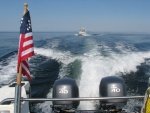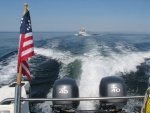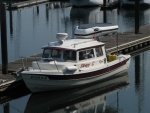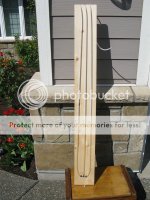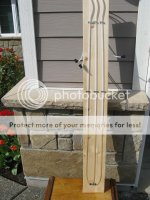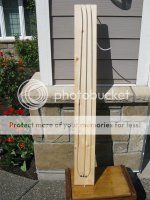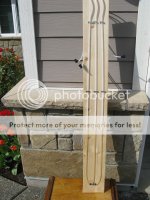Blueback
New member
- Joined
- Oct 2, 2004
- Messages
- 235
- Reaction score
- 0
- C Dory Year
- 1990
- C Dory Model
- user_field_choice.c_dory_model_16_Angler
- Vessel Name
- Blueback
We all have a preference for powering our C-Dory's in terms of outboard makes. For some, its as simple as having a good dealer close at hand promoting a certain make of outboard that does it. For others-- its what they have come to believe is technically the best outboard engine on the market in terms of reliability and long service potential.
For me, in buying a used Honda BF50 2003 carbed unit, was, initially, the price I was able to pick it up for. However, after a season of using this reliable engine I decided to see if I could improved the low speed smoothness (idle to 2500RPMs. I built my own manometer and found that the carbs. were out of synch a bit.. My manometer is very sensitive and I think I have that part nailed down now. Secondly I am starting to try a Yamaha product too (LOL) called "Ring Free" and I believe its improving the performance as well, by de-carbonizing the ring grooves and combustion chamber-etc.
I have based lined the compression across the 3 cylinders and they are amazingly constant at 199 PSI each. Yeah- that makes my a happy camper-err- fisher/cruiser .
Then being an old gear head-marine engineer, I started thinking about this compression range stated for this Honda BF50 at 199- 220 PSI or so and that amazed me as that relates to 12.2 - 13 compression ratio! The only way they can run this engine that high in compression, with regular gas, is having a very sophisticated advance curve to stop detonation (piston knock) coupled with a technically advanced shape in their combustion chamber. This is the where the Honda gets the power out of 3 cylinders making it a light weigh engine 208 lbs-- as apposed to 249lbs for the Yamaha 4 cylinder engine and all the rotation parts for this fourth cylinder. Yeah the Yamie its reliable too, but it no race pony having a 9.5 : 1 compression ratio. This means the thermal efficiency of the Honda is about 8% more than the Yamie and that relates directly to better fuel mileage.
Further proof is the trend in the mileage race in the automotive industry. They are all increasing compression ratios like crazy for the thermal efficiencies that are known to result from higher cylinder pressures.
So in the end Honda may have issues with salt corrosion around their thermostat housing --etc- etc. But when it comes to weight hanging off the back of your boat and better mileage - Yamaha is well behind Honda IMO.
For me, in buying a used Honda BF50 2003 carbed unit, was, initially, the price I was able to pick it up for. However, after a season of using this reliable engine I decided to see if I could improved the low speed smoothness (idle to 2500RPMs. I built my own manometer and found that the carbs. were out of synch a bit.. My manometer is very sensitive and I think I have that part nailed down now. Secondly I am starting to try a Yamaha product too (LOL) called "Ring Free" and I believe its improving the performance as well, by de-carbonizing the ring grooves and combustion chamber-etc.
I have based lined the compression across the 3 cylinders and they are amazingly constant at 199 PSI each. Yeah- that makes my a happy camper-err- fisher/cruiser .
Then being an old gear head-marine engineer, I started thinking about this compression range stated for this Honda BF50 at 199- 220 PSI or so and that amazed me as that relates to 12.2 - 13 compression ratio! The only way they can run this engine that high in compression, with regular gas, is having a very sophisticated advance curve to stop detonation (piston knock) coupled with a technically advanced shape in their combustion chamber. This is the where the Honda gets the power out of 3 cylinders making it a light weigh engine 208 lbs-- as apposed to 249lbs for the Yamaha 4 cylinder engine and all the rotation parts for this fourth cylinder. Yeah the Yamie its reliable too, but it no race pony having a 9.5 : 1 compression ratio. This means the thermal efficiency of the Honda is about 8% more than the Yamie and that relates directly to better fuel mileage.
Further proof is the trend in the mileage race in the automotive industry. They are all increasing compression ratios like crazy for the thermal efficiencies that are known to result from higher cylinder pressures.
So in the end Honda may have issues with salt corrosion around their thermostat housing --etc- etc. But when it comes to weight hanging off the back of your boat and better mileage - Yamaha is well behind Honda IMO.

